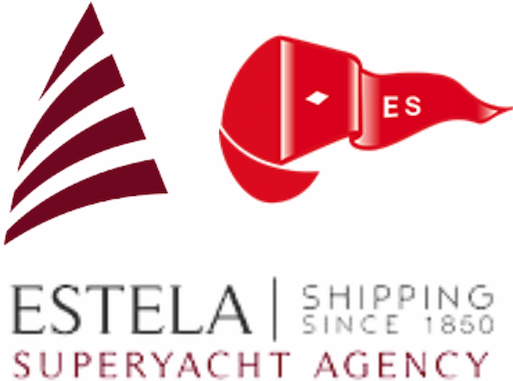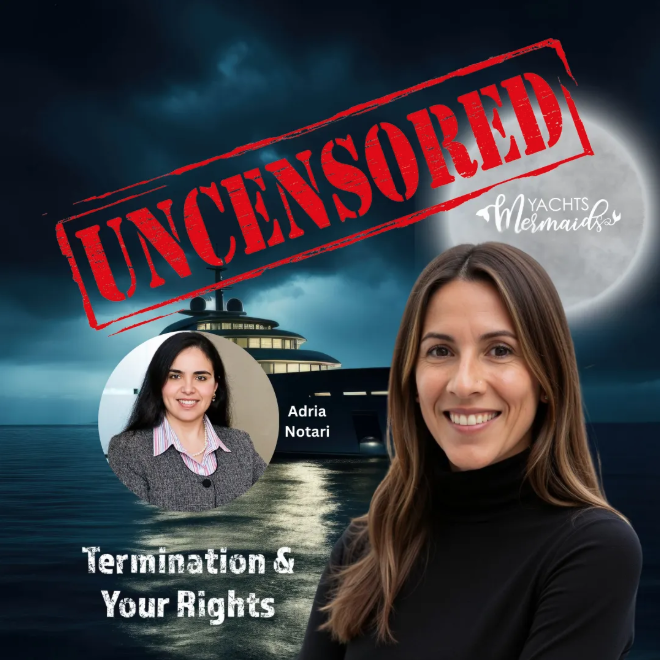The second episode in this three-part ‘Uncensored‘ series from Yachting International Radio is an examination of maritime law and yacht crew welfare.
The maritime industry is prone to systemic failures, illustrated by a distressing real-life case study. A yacht crew member who reported a sexual assault was met with indifference and encouraged to accept a non-disclosure agreement in exchange for a nominal financial settlement. The alleged perpetrator faced no consequences.
This discussion addresses the misconception that maritime law is an impenetrable field and is irrelevant to those working on yachts. On the contrary, litigation can be an important tool for enforcing accountability and driving cultural change, argues former captain, US Navy Reserve lieutenant, and maritime attorney Adria Notari.
Hosted by Marién Sarriera of Yacht Mermaids, the conversation looks at contractual obligations, wrongful termination, jurisdictional complexities, and the legal mechanism of vessel arrest.
Listen here: https://audioboom.com/posts/8765419-retaliation-ndas-and-crew-terminations-maritime-law-with-adria-notari-uncensored
The Harsh Reality: A Case Study
The episode opens with a sobering real-world example that sets the tone for everything that follows. A female crew member was sexually assaulted aboard a yacht by a fellow crew member. Despite following all the “proper” protocols — contacting port authorities, filing police reports, reaching out to the captain, management, flag state, MLC, and various maritime organisations — the outcome was depressingly predictable.
The captain’s first response? “How much money do you want to keep silent?” After two weeks of trauma and bureaucratic runaround, every authority essentially said the same thing: “Sign the NDA, take the €3,000 and go home quietly.”
The victim lost her job (retaliation), while the perpetrator remained aboard. It’s a disturbingly common pattern in the maritime industry.
Why Litigation Matters: Breaking the Cycle
Adria’s key point: The maritime industry’s culture of sweeping incidents under the rug will only change through litigation. Here’s why:
- Transparency: Court filings put everything “in black and white”, the assault, the cover-up, the silencing tactics
- Accountability: Legal action eliminates the cosy culture of NDAs and hush money
- Precedent: Successful cases create awareness and can lead to legislative change
- Deterrent effect: Companies think twice when they know legal consequences await
Important note: NDAs might not even be enforceable; they are often just intimidation tactics. Don’t be silenced without legal advice.
Getting Legal Help: Who Do You Call?
Circumstances can be confusing for crew members. If you are a South African on a Marshall Islands-flagged yacht in French waters, for example, who do you call?
Adria’s advice: Stop overthinking it. You don’t need a law degree to know your rights have been violated.
The Simple Approach:
- Call any trusted lawyer first – they can refer you to the right specialist
- Don’t get bogged down in jurisdictional complexities – that’s the lawyer’s job
- If stuck: Contact the ITF (International Transport Workers’ Federation)
Jurisdiction Reality Check:
The legal system looks at practical factors:
- Where is the base of operations?
- Where does the yacht sign on/off crew?
- Where does it operate from?
Shell companies in tax havens? Flag of convenience? These don’t matter if there are sufficient ties to a jurisdiction with proper courts.
Vessel Arrests: The Nuclear Option
Here’s something unique to maritime law — you can arrest a yacht.
How it works:
- Unpaid wages? You have a maritime lien against the vessel
- A maritime lawyer works with US Marshals (if in US waters)
- The court takes custody of the yacht
- Boat can’t move until the claim is resolved
- Crew must disembark
Arrest is a powerful tool that cuts through corporate shell obfuscation.
The Commercial vs Private Vessel Problem
This is where things get particularly frustrating. Many organisations essentially say to crew: “Are you on a private pleasure craft under 500 tonnes? Sorry, we can’t help.”
The reality:
- Commercial vessels: Vessels such as container ships and cruise ships offer a high level of workplace protection
- Private (incl charter) yachts: Often told they have no rights
- The truth: This is nonsense; you still have legal rights
If flag states, ITF, and other organisations [eg Nautilus International or The PYA] slam doors in your face, that doesn’t mean you have no remedy. Contact a maritime attorney.
Contracts: What If You Don’t Have One?
Red flag alert: If a vessel won’t give you a contract, don’t work there. It’s that simple.
But if you’re already aboard without a contract:
- You’re not powerless; basic maritime rights still apply
- You’re entitled to wages, medical care, and a reasonably safe workplace
- The key question: Who is your employer? (This is not always obvious)
For day workers/freelancers:
- MLC requires employment agreements even for temporary workers
- Even without a contract, you may still have protections under maritime law
- Your rights depend on how much you contribute to vessel operations
Employment Termination: At-Will vs Retaliation
Most yacht contracts are “at-will” employment, which either party can end without cause. However, there are crucial exceptions:
Illegal Termination:
- Discrimination based on protected characteristics
- Retaliation for filing injury claims
- Retaliation for reporting unsafe conditions
- Retaliation for reporting harassment/assault
Key Point About Management Companies:
The management company isn’t your employer; they just handle paperwork. The actual employer (often a separate entity from the yacht owner) carries legal responsibility for:
- Safe workplace
- Medical care
- Freedom from harassment/assault
These responsibilities cannot be delegated.
Practical Takeaways
- Don’t be discouraged by being told you have “no rights”
- Contact a lawyer if authorities won’t help
- Know who your actual employer is (It’s probably not who you think)
- Don’t accept that private vessels mean no protection
- Remember: Maritime law gives you rights even without perfect contracts
Listen here: https://audioboom.com/posts/8765419-retaliation-ndas-and-crew-terminations-maritime-law-with-adria-notari-uncensored
About the Guest:
Adria Notari is a licensed maritime lawyer, former seafarer, and passionate advocate for crew rights. Through Notari Law, she fights for the legal protections yacht crew are entitled to — no matter where in the world they’re based.
Website: notarilaw.com
LinkedIn: @Adria Notari
Coming up in Part 3: Civil vs criminal law, evidence requirements, statute of limitations, and ultimate responsibility for seafarer safety.


